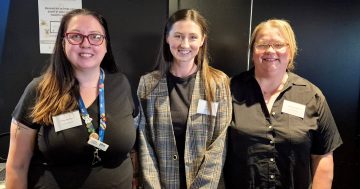Flinders University’s Newsdesk* says people with mental health illnesses fearful and distrusting of many mental health monitoring technologies created to provide help for them.
 An estimated 1 in 5 Australians experience mental illness in any given year – yet these people are fearful and distrusting of many mental health monitoring technologies created to provide help for them.
An estimated 1 in 5 Australians experience mental illness in any given year – yet these people are fearful and distrusting of many mental health monitoring technologies created to provide help for them.
Mental health monitoring tools offer many potential benefits, but they also implicate power issues, which is why people with lived experience of mental illness have told Flinders University researchers they want more input into the design of mental health care monitoring technologies.
“This is a sensitive and stigmatised topic,” says Associate Professor Niranjan Bidargaddi from the Digital Health Research Lab at Flinders University’s College of Medicine and Public Health.
In an Australian first, the research shows that many people with lived experience of mental illness have felt traumatised by an experience of power imbalance that may include feeling stigmatised and disempowered.
Over a two-year consultation focussing on how to redesign mental health service processes with monitoring technologies, participants of the Flinders University Digital Health Research Lab’s Consumer and Carer Advisory Group identified broad problems in areas of agency, access, interactions with health professionals and health systems, medication management and self-monitoring.
“Monitoring is an integral part of taking care in mental health,” explains Associate Professor Niranjan Bidargaddi.
“The rate of relapse in the first five years following initial treatment can be as high as 80 per cent, yet the more that people’s mental health deteriorates with each relapse the harder it is to recover.
“Early treatment and intervention are critical.”
However, during an in-depth, multi-year consultation co-design study of mental health monitoring technologies, the researchers found that consumers whose life is mostly lived indoors will readily ignore prompts that overwhelmingly focus on the benefits of outdoor exercise, or will fail to understand the crucial support that carers offer.
One participant in the research admitted: “Yes, I make my own medication adjustments… this really enables me to minimise my medication and minimise the side effects.”
Another of the research participants told them: “The actual range of side effects has never been discussed with me on any drug that I’ve had.”
Furthermore, numerous mental health apps have failed due to a lack of co-design consultation.
Problem areas include low usability, engagement, knowledge and the need for more training/support.
“Our findings underline the importance of co-design in this context, and the consumer’s motivation to feel respected and empowered to regain a sense of wellbeing during their recovery process,” says research co-author Bronwin Patrickson, from Flinders University’s Digital Health Research Lab.
“They want to feel rehumanised and shift the focus towards recovery.
“The often-undervalued but essential contributions that informal carers such as family members can also influence consumer recovery as well.”
Problems identified by the researchers included smartphone ownership being funded by the NDIS but not the data plans that enable those phones to be used.
Priority sites for app design intervention include the strengthening of social and interpersonal support, on the proviso that these personal and social connections are balanced by strong consent procedures and boundary-setting.
“Incorporating in-depth knowledge of the lived experience of mental illness and the broader contexts of mental health care through consumer and carer co-design is strongly recommended,” says Ms Patrickson.
The researchers say that while these findings are of interest for the general public, they are especially relevant for health care professionals, digital health designers and policy makers.
The research – “In-Depth Co-Design of Mental Health Monitoring Technologies by People with Lived Experience”, by Bronwin Patrickson, Mike Musker, Dan Thorpe, Yasmin van Kasteren, Niranjan Bidargaddi and The Consumer and Carer Advisory Group (CCAG) – has been published by Future Internet.
*Flinders University is a public research university based in Adelaide, South Australia, with a footprint extending across 11 locations in South Australia and the Northern Territory.
This article first appeared at news.flinders.edu.au











